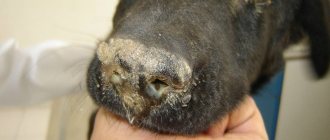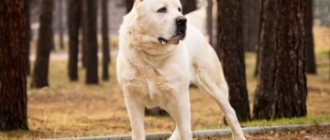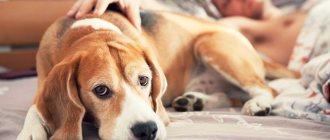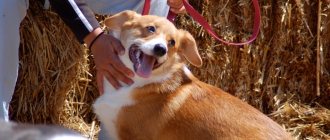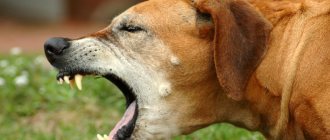At my feet
It is not uncommon for dogs (just like cats) to sleep at people’s feet. And most of us regard this position as the animal's utmost devotion. However, this is not entirely true. Indeed, your dog is very devoted to you, but by this he also wants to say that in your sleep you toss and turn too much. Its position at the feet is explained by the fact that if you make any sudden movement in your sleep, the dog will be able to quickly jump out of bed so that you do not crush it.
Paws up
On the back with paws up - a pose typical of representatives of long-legged breeds. This comical position symbolizes happiness and serenity.
It is chosen by brave dogs with a calm, independent character. They know how to stand up for themselves both in front of their relatives and in front of people, and therefore they are not afraid of anyone.
As in the previous case, the animal completely opens its internal organs and neck, which symbolizes complete trust in the owner.
In the fetal position
Our four-legged pets often curl up into a “donut” and sleep in this position. We think that they are simply freezing or feeling a chill from somewhere, so this is how they protect themselves and warm themselves. However, if the dog curls up and lies in close proximity to you, or even clings to you, it means that he feels completely safe next to you. In this way she shows that she perceives you as a parent and as if she turns into a child again and again so that you take care of her.
What can be treated at home, and what should you consult a veterinarian for?
It is impossible to make an accurate diagnosis on your own. It can only be guessed by chance. Because of this, veterinarians categorically do not recommend self-medication.
If you cannot get to a doctor in the near future, then provide first aid to your pet. You can relieve pain with a light abdominal massage and a fasting diet.
In case of poisoning, it is recommended to rinse the animal’s stomach and intestines, but only if the cause of intoxication is known. Washing should also be avoided if gastrointestinal bleeding is suspected, if there is loss of consciousness, or if acids or alkalis have been ingested. In these situations, you should urgently call a veterinary service or go to the clinic yourself.
Most of the medications in your home medicine cabinet are dangerous for four-legged pets. They should only be given after the approval of a veterinarian, who can be easily contacted by telephone.
After passing all the necessary tests, the animal may be prescribed the following medications:
- digestive enzymes that facilitate the breakdown of food, and probiotics that restore intestinal microflora;
- anthelmintics, antibiotics and antivirals that act directly on the pathogen;
- antacids with an enveloping effect;
- antipyretic, antiemetic and anti-inflammatory;
- immunomodulators that stimulate the functioning of immune cells;
- diuretics, sorbents and choleretic;
- laxatives or antidiarrheals;
- anti-ulcer, reducing the acidity of gastric juice;
- antispasmodics and analgesics;
- hepatoprotectors that restore damaged liver cells.
Surgery may also be required. It is used for blockage of the bile ducts, oncology, abscesses and necrosis. Until recovery, the pet is put on a strict diet that reduces the load on the affected organs.
Between masters
It happens that as soon as two lovers fall asleep, a four-legged miracle immediately emerges between them. The main reason for this is most often jealousy. If you previously lived only with a dog, and now you have a dear friend, most likely, the pet simply does not want to share you with anyone and shows the new person that here, first of all, they love him. If you have been together for a long time and got a dog, being already a couple, then this may simply be a sign that the dog adores both of you and does not want anyone to be offended that he lay down not next to him, but next to another the owner.
The importance of diagnosis: self-diagnosis or in a veterinary clinic
Self-diagnosis includes a thorough examination of the pet and recording all alarming symptoms. The veterinarian will need this data to collect anamnesis. It is also recommended to immediately take urine, stool and vomit samples with you. As a last resort, you can photograph them.
In addition to basic tests, the dog will have to undergo an ultrasound and x-ray. With their help, you can detect tumors, ascites, kidney abnormalities and intestinal stones, as well as inflammation in the stomach, intestines and genitourinary system. For ascites, a cytology test is prescribed. The examination is carried out until the exact cause of the ailment is discovered, since until this point the treatment is only symptomatic.
On the pillow
As a rule, the softest place, on the pad, is chosen by small and very tiny dogs. First of all, this is because it is softest there and the dog, due to its small parameters, fits. Plus, you put your face on the pillow, and the dog in this position is in the closest emotional proximity with you. If your pet chooses this particular place, it means that he loves you endlessly and is attached to you more than anything in the world.
A student at the Vietnam Police Academy shared how she takes care of her facial skin.
It’s good to wash often: myths about shampoo and hair care that only harm
The money tree pleases with lush flowering: my secret is in caring for the leaves
This is interesting
It happens that dogs start digging and rustling their sleeping place before going to bed and spinning around. This is how the dog tries to create more comfort for itself, it wants to create more comfort. Often this indicates the animal’s anxiety, that it has experienced some kind of moral dissatisfaction during the day and wants, when going to sleep at night, to create a more favorable atmosphere for itself that it had during the day.
Of course, there are also poses that defy any classification. Often this becomes a subject for a photo. Puppies or hyperactive dogs who fall asleep during their pranks in a place where fatigue overtook them can fall asleep in a completely unimaginable position.
INTERESTING: Some owners notice that their sleeping dog may cluck and twitch its paws slightly in its sleep. This suggests that the dog is deeply asleep and dreaming at this moment.
Under the blanket
This doesn’t happen very often, but nevertheless, some dogs sleep under a blanket! And this despite the fact that our homes today are incredibly warm even in winter, and our four-legged animals are covered with a solid layer of fur. Most likely, the animal goes right under the blanket with you because it feels a lack of attention or the presence of the owner. Perhaps you work long hours and come home only in the evening, but your dog is bored all day long. She misses your smell, so she makes up for the lack just under the blanket with you.
The dog sleeps on its back: normal or pathological
Our pets are full-fledged individuals who have their own preferences and opinions about comfort. Do you find it strange that your dog sleeps on his back? Don't worry, this is completely normal, and there are reasons for every dog sleeping position. Observations by owners and animal psychologists made it possible to establish some relationship between sleep posture and the temperament of the ward.
Initially, the theory of sleeping positions was treated with skepticism, exactly until the moment sleep positions in humans were interpreted. You may have come across information that married couples sleep differently, which reflects the subconscious mood of the partners towards each other (trust, mistrust, mutual tenderness, etc.). A little later, psychologists came to the conclusion that sleep position depends on a person’s mood and his internal experiences.
Conclusions about human sleep positions are made based on observations of control groups. Such studies have not been conducted for dogs, but popular statistics are very close to the truth, at least according to the majority of four-legged owners.
Observations of wild dogs made it possible to understand that each sleep position has certain functions . Larger dogs sleep in relaxed positions because they are in a defensive position. Puppy bitches sleep in such a way that, if necessary, they can quickly get to their feet and protect their offspring. Male leaders sleep not deeply and with their backs to the pack, because they instinctively protect their subjects. Puppies are children, so they sleep as they please and the position is not always natural.
Alarm clock dog
When your pet falls asleep next to you unnoticed, but in the morning brings his wet leather nose to your face to wake you up, this means that he is very playful. Such animals do not like to sit still, they are very active and always on the alert. In addition, a four-legged dog with such a character will always protect its owner, as it loves him immensely.
If there is little snow, there will be no harvest: December 16 is Ivan the Silent Day
Women's jeans: before you buy them, you need to pay attention to one detail
Smooth and fresh skin: dermaplaning, or why a woman needs to shave her face
Sleeping with your paws up
A rather open position, in which yard dogs never sleep, forced to constantly be on the lookout. While pets, who completely trust their owners, often fall asleep in this position, revealing their most vulnerable places when they are tired or want to cool down after a walk with active games. Dogs with long legs especially love this pose.
When getting a pet, it is important to be extremely attentive to how the animal behaves. Not being able to speak, they are sometimes quite defenseless and vulnerable, and therefore the main task of the owner is to recognize the needs and desires of their four-legged friend in time in order to provide him with the most comfortable conditions for growth and development.
On the edge of the bed
Further than at the feet - on the very edge of the bed - representatives of large or fighting breeds of dogs most often sleep. Such pets always keep everything under control and consider it their duty to protect their owner, especially when he is sleeping. This is a faithful guard who is always on the alert, he is ready not only to warn you of danger, but also to actively protect you. The dog also chooses this place because it is quite large, and it is simply hot in blankets and pillows.
Quenching the itch
There's nothing more annoying than an itch that you can't scratch. Sometimes dogs roll onto their backs to relieve back itching. This is why you may see your dog spinning wildly upside down. They can't ask you to scratch them, so this may be their only way to get relief.
Dogs often do this on carpeting because it has a rougher texture than hardwood or other floor surfaces. They may also collapse on one of their toys to stop the incessant itching.
I'll steal the bed...
Some dogs, regardless of size, become the stealers of entire beds. YOU go to sleep just next to your pet, but during the night it seems to push you to the edge, and in the morning you realize that it’s a miracle you didn’t fall over, since you’re already sleeping on a narrow strip, and even the blanket is pressed by your pet. This situation only means one thing - you are spoiling the dog a lot. This does not mean that she does not love you or wants to kick you out and reign in the house. It’s just that she is most likely given a lot of privileges, and in principle there are no punishments, even for misconduct. If you behave a little more strictly towards your pet, he will be more modest.
Found a violation? Report content
Sleeping on your back is a calming tactic
Dogs only have sweat glands in their paw pads. They cannot regulate their body temperature the way humans do through sweating. During the hot, humid months of summer, when dogs easily overheat, she finds different approaches to cool down. Most dogs have finer fur on their bellies. Sleeping on his back and exposing his sparsely furry belly, combined with vasodilation, allows your dog's blood to flow toward his skin, where it is cooler, and away from his core, where it is warmer.
Sleeping on your dog's back also allows you to get maximum leverage on your paw. Again, dogs sweat in the paw area, so getting air into the paws can actually provide thermoregulation through sweating.
Any dog can overheat in hot weather, but some breeds and age groups are at greater risk than others. Puppies and older dogs cannot control thermoregulation in the same way as healthy adult dogs and are therefore more likely to overheat. Additionally, brachycephalic breeds, that is, breeds with flat noses or short noses (pugs, bulldogs, Boston terriers, Pekingese, boxers, Shih Tzus, etc.), are more prone to overheating . Dogs with comorbid conditions, especially those affecting their heart and/or lungs, may also be at high risk of overheating. Obesity and overweight dogs can also cause overheating.
If you find that your dog sleeps more on his back during the warmer months, or if your dog is prone to overheating, he may benefit from a bed with a cooled gel. You should be careful when choosing such a bed, especially if your puppy likes to chew on everything. The gel on these specially made beds can cause gastrointestinal distress and can also lead to foreign body obstruction.


